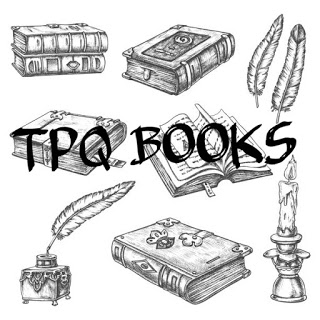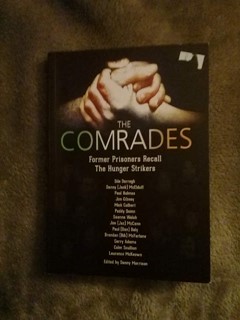Some have been very good and others not so good. I called to see my friend Paddy yesterday and he asked if I had read a new book titled The Comrades. I told him I hadn't and to be frank I was sceptical about it but he suggested I take it and then give him my opinion on it.
About 10pm last night I flicked through it because I am reading a book written by Rubin 'Hurricane' Carter, which I'm enjoying very much. I decided to put it away and opened The Comrades and after two hours I finished it and despite my scepticism I thought most of it was very good. It is a relatively short book with 122 pages.
It begins with a poem written by Bobby Sands called 'Comrades in the Dark' and then followed with the introduction by a woman who was in Armagh gaol during those terrible days of protest.
It then gives short stories of the 12 men who died, two in English prisons in 1974 and 1976 and the other 10 in the H-Blocks of Long Kesh. Much has been written about Michael Gaughan, Frank Stagg, Bobby Sands, Frank Hughes, Raymie McCreesh, Patsy O'Hara, Joe McDonnell, Martin Hurson, Kevin Lynch, Kieran Doherty, Tom McElwee and Mickey Devine. And for the most part these short pieces were written by men who knew the lads personally.
Some of the writers were captured on operations with their comrades and others didn't get to know them until they met in gaol. I have written many times that it's important the memory of our fallen comrades lives on and no doubt much more will be written about them.
The 1970s and 80s were the most intense times of this phase of struggle and the prisons were full of men and women. most continued that struggle whilst behind bars. Protests would take place for better conditions, transfer from English to Irish gaols and of course for political status. The men written about in this book were members of the IRA and the INLA. And as they embarked upon the hunger strike they knew the dangers they faced.
None talked of a 'peace process', decommissioning weapons or taking seats in Leinster House and Stormont but of a 32 County Socialist Republic.
I have always argued when people write or speak about the dead hunger strikers their names shouldn't be used in electioneering but unfortunately this is the case when Sinn Féin stand in elections. Members of that party have every right to write about them because some knew them personally, which can be seen in this book.
Some of the short pieces written by the men must have been very hard and even an oul cynic like me was moved by a lot of it. Many readers will take something different from it but I would recommend this book.
The book finishes, as it started, with a very moving poem this time written by former hunger striker, Laurence McKeown. It's about Mickey Devine and simply called 'Red Mick'.
About 10pm last night I flicked through it because I am reading a book written by Rubin 'Hurricane' Carter, which I'm enjoying very much. I decided to put it away and opened The Comrades and after two hours I finished it and despite my scepticism I thought most of it was very good. It is a relatively short book with 122 pages.
It begins with a poem written by Bobby Sands called 'Comrades in the Dark' and then followed with the introduction by a woman who was in Armagh gaol during those terrible days of protest.
It then gives short stories of the 12 men who died, two in English prisons in 1974 and 1976 and the other 10 in the H-Blocks of Long Kesh. Much has been written about Michael Gaughan, Frank Stagg, Bobby Sands, Frank Hughes, Raymie McCreesh, Patsy O'Hara, Joe McDonnell, Martin Hurson, Kevin Lynch, Kieran Doherty, Tom McElwee and Mickey Devine. And for the most part these short pieces were written by men who knew the lads personally.
Some of the writers were captured on operations with their comrades and others didn't get to know them until they met in gaol. I have written many times that it's important the memory of our fallen comrades lives on and no doubt much more will be written about them.
The 1970s and 80s were the most intense times of this phase of struggle and the prisons were full of men and women. most continued that struggle whilst behind bars. Protests would take place for better conditions, transfer from English to Irish gaols and of course for political status. The men written about in this book were members of the IRA and the INLA. And as they embarked upon the hunger strike they knew the dangers they faced.
None talked of a 'peace process', decommissioning weapons or taking seats in Leinster House and Stormont but of a 32 County Socialist Republic.
I have always argued when people write or speak about the dead hunger strikers their names shouldn't be used in electioneering but unfortunately this is the case when Sinn Féin stand in elections. Members of that party have every right to write about them because some knew them personally, which can be seen in this book.
Some of the short pieces written by the men must have been very hard and even an oul cynic like me was moved by a lot of it. Many readers will take something different from it but I would recommend this book.
The book finishes, as it started, with a very moving poem this time written by former hunger striker, Laurence McKeown. It's about Mickey Devine and simply called 'Red Mick'.








Nice words Padraic.
ReplyDeleteA bit sceptical tho when i see a D.Morrison and published by the Bobby Sands Trust. Would this not be a boost to SF funds.
Still I will purchase it in respect of the 12 Hunger Strikers.
Given Chopper's perspective on the SF project, I thought this was an eminently fair review. He told it as he read it and didn't turn his review into a polemic. Books are not nails, something to always be approached with a hammer.
ReplyDeleteThe review is anything but deferential.
I share VFP's sentiment - I would like to read it but will wait until somebody sends me their used copy or I buy it in a SVP shop.